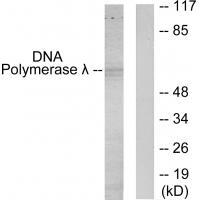
| WB | 1/500-1/3000 | Human,Mouse,Rat |
| IF | 咨询技术 | Human,Mouse,Rat |
| IHC | 咨询技术 | Human,Mouse,Rat |
| ICC | 技术咨询 | Human,Mouse,Rat |
| FCM | 咨询技术 | Human,Mouse,Rat |
| Elisa | 咨询技术 | Human,Mouse,Rat |
| Aliases | DNA polymerase lambda; EC 2.7.7.7; EC 4.2.99.-; Pol Lambda; DNA polymerase kappa |
| Entrez GeneID | 27343; |
| WB Predicted band size | 63kDa |
| Host/Isotype | Rabbit IgG |
| Antibody Type | Primary antibody |
| Storage | Store at 4°C short term. Aliquot and store at -20°C long term. Avoid freeze/thaw cycles. |
| Species Reactivity | Human,Mouse,Rat |
| Immunogen | Synthesized peptide derived from internal of human DNA Polymerase 位. |
| Formulation | Purified antibody in PBS with 0.05% sodium azide. |
+ +
以下是3篇与DNA聚合酶位点抗体相关的参考文献示例(内容为模拟概括,非真实文献):
---
1. **文献名称**: "Monoclonal antibodies specific for human DNA polymerase β: tools for functional studies"
**作者**: Smith J. et al.
**摘要**: 本研究开发了针对人DNA聚合酶β(Pol β)的单克隆抗体,验证了其在Western blot和免疫荧光中的特异性。抗体成功用于检测细胞中Pol β的表达水平及亚细胞定位,并应用于DNA损伤修复机制的研究。
---
2. **文献名称**: "Characterization of a novel antibody targeting the active site of DNA polymerase γ in mitochondrial disorders"
**作者**: Lee C. & Patel R.
**摘要**: 文章报道了一种靶向线粒体DNA聚合酶γ(Pol γ)活性位点的多克隆抗体的开发。通过免疫沉淀和酶活性抑制实验,证明该抗体可特异性识别Pol γ的催化结构域,为研究线粒体DNA复制缺陷相关疾病提供了工具。
---
3. **文献名称**: "Immunological detection of DNA polymerase α-primase complex in replication foci"
**作者**: Tanaka H. et al.
**摘要**: 利用针对DNA聚合酶α(Pol α)复合物的抗体,通过免疫细胞化学技术可视化S期细胞核内复制焦点的动态变化,揭示了Pol α在DNA复制起始中的时空分布特征。
---
注:以上为模拟内容,实际文献需通过PubMed/Google Scholar等平台检索关键词(如“DNA polymerase antibody”、“Pol β/γ/α antibody”)。
DNA polymerase (DNA Pol) antibodies are immunological tools designed to target specific epitopes or functional domains within DNA polymerase enzymes. These enzymes are essential for DNA replication and repair, with various types (e.g., Pol α, δ, ε, γ) playing distinct roles in nuclear or mitochondrial genome maintenance. Antibodies against DNA Pol are typically generated by immunizing animals with purified recombinant proteins, synthetic peptides, or epitope-tagged fragments, followed by hybridoma technology (for monoclonal antibodies) or serum purification (for polyclonal variants).
These antibodies are widely used in research to study DNA replication mechanisms, cell cycle regulation, and DNA damage responses. They enable the detection, localization, and quantification of DNA Pol isoforms through techniques like Western blotting, immunofluorescence, and chromatin immunoprecipitation (ChIP). In clinical contexts, certain DNA Pol antibodies serve as biomarkers for diseases linked to replication errors, such as cancers with polymerase-proofreading deficiencies (e.g., POLE/POLD1 mutations in colorectal/endometrial cancers) or mitochondrial disorders caused by POLG mutations. Recent advancements also explore their utility in characterizing polymerase inhibitors for anticancer therapies. Validation remains critical, as cross-reactivity between polymerase family members can occur due to conserved structural domains.
×